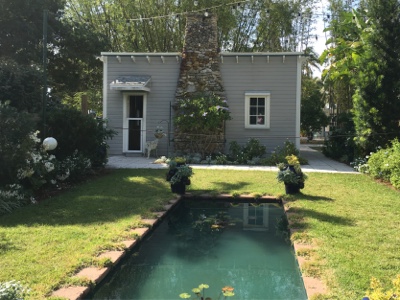Edison purchased property on the banks of the Caloosahatchee River and built his modest winter home there. A laboratory where Edison could continue his eighteen hour workdays soon followed.
Then he added a guest house and connected it to the original with a covered walkway.
A swimming pool soon followed
As well as a study,
And a caretaker's cottage with a 3-car garage.
Why did he need a 3-car garage? Because his next door neighbor Henry Ford periodically presented new models to him.
Ford who resigned as chief engineer from Edison's company to start an automobile factory gave his mentor new models as they rolled off the factory line.
Last week a fellow Habitat volunteer Barry, Tim and I paid a visit to the estates of these two friends. The young historian who led our tour group had plethora of facts and anecdotes to tell about both men.
I didn't know that Edison and I share a similar affliction: we are both deaf. When he dined at his home in Florida, he liked to sit at the head of the table facing the river so he could appreciate the view even though he couldn't follow the dinner conversation. When he finished eating, he would abruptly rise and go on about his business, leaving his guests to fend for themselves. He much preferred to converse with his guests one on one. Me, too!
Not only did Ford and Edison spend winters in close proximity, they also, along with rubber tire magnate Harvey Firestone and naturalist John Burroughs, went camping together. Calling themselves as "The Vagabonds," their first camping trip was to the Florida Everglades in 1914 and for the next 10 years their trips continued up and down the Eastern seaboard and inland as far as Tennessee.
Not only did Ford and Edison spend winters in close proximity, they also, along with rubber tire magnate Harvey Firestone and naturalist John Burroughs, went camping together. Calling themselves as "The Vagabonds," their first camping trip was to the Florida Everglades in 1914 and for the next 10 years their trips continued up and down the Eastern seaboard and inland as far as Tennessee.
One of Edison's interests was botany. He planted a botanical garden on the estate. During World War I, he searched for a native plant that would produce rubber in the hope of easing the shortage of tires.
For 50 years the Edisons wintered here in Fort Myers. A decade after his death in 1931, his widow gave the estate to the city.















No comments:
Post a Comment